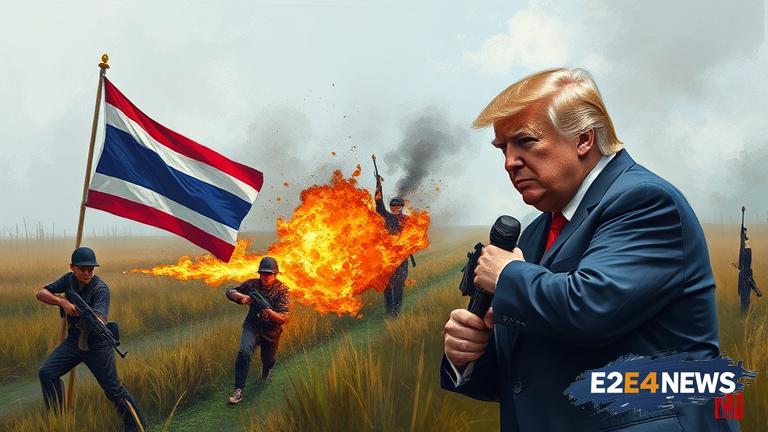The conflict between Thailand and Cambodia has been ongoing for several years, with both countries claiming ownership of a disputed border area. The situation has deteriorated in recent weeks, with reports of exchanges of gunfire and artillery fire. The United Nations has called for a ceasefire, citing concerns over the humanitarian impact of the conflict. US President Donald Trump has also weighed in, urging both sides to seek a peaceful resolution. The clashes have resulted in the displacement of thousands of civilians, with many forced to flee their homes. The conflict has also had a significant impact on the regional economy, with trade and tourism affected. The Thai government has accused Cambodia of violating its sovereignty, while Cambodia has claimed that Thailand is attempting to annex its territory. The dispute centers on a 4.6-square-kilometer area near the Preah Vihear temple, a UNESCO World Heritage site. The temple has been a source of tension between the two countries for decades. In 1962, the International Court of Justice ruled that the temple belonged to Cambodia, but the surrounding area remains disputed. The conflict has been fueled by nationalist sentiment in both countries, with many calling for the protection of their country’s sovereignty. The Thai military has deployed troops to the border area, while Cambodia has also increased its military presence. The situation remains volatile, with reports of ongoing clashes. The international community has expressed concern over the conflict, with the European Union and other countries calling for a peaceful resolution. The Association of Southeast Asian Nations (ASEAN) has also urged both sides to seek a diplomatic solution. The conflict has significant implications for regional stability, with the potential to draw in other countries. The US has a significant interest in the region, with several key allies and trade partners. China has also been watching the situation closely, with concerns over the potential impact on its own regional interests. The conflict has also raised concerns over the potential for human rights abuses, with reports of civilians being caught in the crossfire. The UN has called for both sides to respect international humanitarian law and protect civilians. The situation remains fluid, with the potential for further escalation. A ceasefire is urgently needed to prevent further bloodshed and protect the rights of civilians. The international community must continue to pressure both sides to seek a peaceful resolution, with a negotiated settlement the only viable solution to the conflict.
